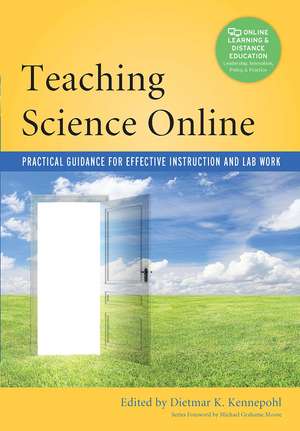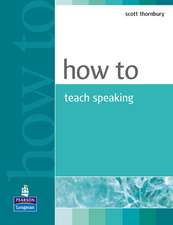Teaching Science Online: Practical Guidance for Effective Instruction and Lab Work
Editat de Dietmar Kennepohlen Limba Engleză Paperback – 3 aug 2016
| Toate formatele și edițiile | Preț | Express |
|---|---|---|
| Paperback (1) | 311.64 lei 6-8 săpt. | |
| Taylor & Francis – 3 aug 2016 | 311.64 lei 6-8 săpt. | |
| Hardback (1) | 1008.48 lei 6-8 săpt. | |
| Taylor & Francis – 9 aug 2016 | 1008.48 lei 6-8 săpt. |
Preț: 311.64 lei
Nou
Puncte Express: 467
Preț estimativ în valută:
59.63€ • 61.52$ • 49.76£
59.63€ • 61.52$ • 49.76£
Carte tipărită la comandă
Livrare economică 26 martie-09 aprilie
Preluare comenzi: 021 569.72.76
Specificații
ISBN-13: 9781620361887
ISBN-10: 1620361884
Pagini: 276
Dimensiuni: 178 x 254 mm
Greutate: 0.5 kg
Ediția:1
Editura: Taylor & Francis
Colecția Routledge
Locul publicării:Oxford, United Kingdom
ISBN-10: 1620361884
Pagini: 276
Dimensiuni: 178 x 254 mm
Greutate: 0.5 kg
Ediția:1
Editura: Taylor & Francis
Colecția Routledge
Locul publicării:Oxford, United Kingdom
Public țintă
Postgraduate and Professional Practice & DevelopmentNotă biografică
Dietmar Kennepohl is Professor of Chemistry and Associate Vice President Academic at Athabasca University (AU) Canada’s Open University. He graduated Summa Cum Laude from McMaster University with a B.Sc. (Honours) degree in chemistry and continued directly into his doctoral studies at the University of Alberta in main group synthetic chemistry. Before coming to Athabasca University he also did a post-doctoral fellowship at the University of Guelph and was an Alexander von Humboldt Fellow at the Universität Göttingen in Germany. Most of his teaching experience has been in a distributed and online setting. He holds both university and national teaching awards. Over the years, his research interests have included chemical education as well as petroleum, main group and coordination chemistry. His research in chemical education includes online chemistry courses and concentrates on the use of innovative distance delivery methods for undergraduate laboratory work. Michael G. Moore is known in academic circles for his leadership in promoting the scholarship of distance education and online learning. He published his first statement of theory about distance education in 1972, and has achieved a number of firsts in this field.While teaching the first graduate course in this subject at University of Wisconsin in the mid 70's, he was contributory to founding the national annual conference there. Appointed to The Pennsylvania State University in 1986, he founded the first American journal (American Journal of Distance Education) and established the first sequence of taught graduate courses, including the first such courses taught online. Moore has served on the editorial boards of all the main journals of distance education, and about a hundred publications include the books, Contemporary Issues in American Distance Education (Pergamon Press, 1990), Distance Education: a Systems View, co-authored with G. Kearsley (Wadsworth Publishers, Third Edition, 2011 in press), p
Cuprins
Foreword—Michael G. Moore Acknowledgments Introduction. Setting the Stage—Dietmar K. Kennepohl Part One. The Basics of Getting Science Courses Online 1. The Basics of Getting Biology Courses Online—Wendy Wright, Jennifer Mosse, Barbara C. Panther 2. Teaching Undergraduate Chemistry by Distance and Online. Lessons from the Front Line—Peter Lye, Erica Smith 3. Developing Online Earth Science Courses—Kevin F. Downing 4. Physics Teaching in Distance Education—Robert Lambourne and Nicholas Braithwaite Part Two. Applications Case Studies and Special Topics 5. Science Online. Bringing the Laboratory Home—Mary V. Mawn 6. Practical Biology at a Distance. How Far Can We Go With Online Distance Learning?—Mark C. Hirst and Hilary A. MacQueen 7. Assessment in Physics Distance Education. Practical Lessons at Athabasca University—Farook Al-Shamali and Martin Connors 8. Computer-Based Laboratory Simulations for the New Digital Learning Environments—Jessie Webb, Richard Swan, and Brian F. Woodfield 9. Remote Access Laboratory Equipment for Undergraduate Science Education—Daniel M. Branan, Paul Bennett, and Nick Braithwaite 10. Situated Science Learning for Higher Level Learning With Mobile Devices—Brett McCollum 11. Online Delivery of Field- and Laboratory-Based Environmental and Earth Sciences Curriculum—Ron Reuter 12. Enabling Remote Activity. Widening Participation in Field Study Courses—Trevor Collins, Sarah Davies, and Mark Gaved 13. Collaborative e-learning in Pharmacy. Design, Evaluation, and Outcomes of a European Cross-Border Project—Marion Bruhn-Suhr, Dorothee Dartsch, and Jasmin Hamadeh 14. Online Professional Development for Australian Science Teachers. Developing and Deploying a Curriculum Evaluation Model—Karen Spence, Jennifer Donovan, and P. A. Danaher Part Three. Summary and Future Trends The Future Starts Today—Dietmar K. Kennepohl Appendix A. Online Versus Face-to-Face Approaches for Various Learning Activities Appendix B. Selected Online Resources Editor and Contributors Index
Recenzii
"Kennepohl and the other authors of this text expertly dispel the myth that science, a highly skills-based practice, cannot be taught online. Chapter authors offer teaching strategies to enrich online science experiences and provide numerous examples of collaborative endeavors, innovative implementation of current technologies, and case studies featuring successful online science courses with experiential requirements. In many cases, chapter authors created the programs and courses they write about. Novice and veteran faculty, higher education administrators, and education specialists in online learning would all benefit from reading this book."
Teachers College Record
"Dietmar Kennepohl has drawn upon an international network of innovative educators in various science disciplines in college and university settings. Each are bringing in their unique experiences and a review of research literature for developing and delivering “hands-on” activities in an online environment, which is equivalent to that we would see in conventional face to face classroom settings. Laying out a foundational base of knowledge in four general science areas, this collection also branches into first hand descriptions from educators, including the use of online tools to provide experiences not possible in traditional face to face classroom settings and unique ways in which online tools open doors for those with different abilities (disabilities). This book is a nice resource for anyone new to online science education, as well as for someone looking for a compiled summary of latest research findings in this area or just wanting some new ideas to try in their own online science courses."
Dr. Deana Namuth-Covert, Professor, Director of Online Education and Outreach at The Ohio State University College of Food Agricultural and Environmental Sciences
"Teaching online and at a distance has been enabled to an unimaginable degree by information technology. The rapidly changing world of these modes of teaching needs best practices. And the comprehensive yet readable book that Dietmar Kennepohl has edited brings together in one place just that – the collective, hands-on experience of committed teachers across the world. “The Future Starts Today” is an apt phrase to describe this first class volume."
Roald Hoffmann, Nobel Laureate in Chemistry, Educator, and Writer
“This book could not be more timely. While the need and demand for STEM is acute, traditional brick and mortar higher education systems are having difficulty responding to it. Online, open and flexible learning presents a viable alternative and supplement to meet demand, and the challenges related to cost, access and flexibility.
This book offers guidance and practical solutions, not least for dealing with laboratory problems. It moreover proposes the use of exciting and hyper relevant innovative pedagogies, such as “learning through argumentation” recommended in the UK’s Open University 2015 Innovating Pedagogy report.
This practical approach offers great inspiration for teaching STEM, not least in developing economies where learning institutions may have limited or no access to physical laboratories, or indeed and in any situation where it may be possible to carry out laboratory experiments remotely, using a laboratory kit.
Practitioners in distance teaching have often been forerunners for innovative and modern methodology and pedagogy. This book will inspire readers who aspire to innovate, guided by these experienced scientists who demonstrate what works.”
Gard Titlestad, Secretary General, International Council for Open and Distance Education
Teachers College Record
"Dietmar Kennepohl has drawn upon an international network of innovative educators in various science disciplines in college and university settings. Each are bringing in their unique experiences and a review of research literature for developing and delivering “hands-on” activities in an online environment, which is equivalent to that we would see in conventional face to face classroom settings. Laying out a foundational base of knowledge in four general science areas, this collection also branches into first hand descriptions from educators, including the use of online tools to provide experiences not possible in traditional face to face classroom settings and unique ways in which online tools open doors for those with different abilities (disabilities). This book is a nice resource for anyone new to online science education, as well as for someone looking for a compiled summary of latest research findings in this area or just wanting some new ideas to try in their own online science courses."
Dr. Deana Namuth-Covert, Professor, Director of Online Education and Outreach at The Ohio State University College of Food Agricultural and Environmental Sciences
"Teaching online and at a distance has been enabled to an unimaginable degree by information technology. The rapidly changing world of these modes of teaching needs best practices. And the comprehensive yet readable book that Dietmar Kennepohl has edited brings together in one place just that – the collective, hands-on experience of committed teachers across the world. “The Future Starts Today” is an apt phrase to describe this first class volume."
Roald Hoffmann, Nobel Laureate in Chemistry, Educator, and Writer
“This book could not be more timely. While the need and demand for STEM is acute, traditional brick and mortar higher education systems are having difficulty responding to it. Online, open and flexible learning presents a viable alternative and supplement to meet demand, and the challenges related to cost, access and flexibility.
This book offers guidance and practical solutions, not least for dealing with laboratory problems. It moreover proposes the use of exciting and hyper relevant innovative pedagogies, such as “learning through argumentation” recommended in the UK’s Open University 2015 Innovating Pedagogy report.
This practical approach offers great inspiration for teaching STEM, not least in developing economies where learning institutions may have limited or no access to physical laboratories, or indeed and in any situation where it may be possible to carry out laboratory experiments remotely, using a laboratory kit.
Practitioners in distance teaching have often been forerunners for innovative and modern methodology and pedagogy. This book will inspire readers who aspire to innovate, guided by these experienced scientists who demonstrate what works.”
Gard Titlestad, Secretary General, International Council for Open and Distance Education
Descriere
This book presents the guidance of expert science educators from the US and from around the globe. They describe key concepts, delivery modes and emerging technologies, and offer models of practice.






